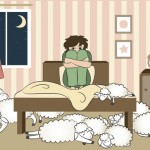
Andrew Shepherd appraises and summarises a systematic review of antidepressant withdrawal symptoms after SSRI discontinuation, which leads him to reconsider his own clinical practice.
[read the full story...]
Andrew Shepherd appraises and summarises a systematic review of antidepressant withdrawal symptoms after SSRI discontinuation, which leads him to reconsider his own clinical practice.
[read the full story...]
Amy Green appraises a systematic review of CBT for insomnia (CBTi) in people with comorbid mental illness, which concludes that cognitive behaviour therapy could be an effective alternative to hypnotics. However, concerns about the review methodology cast some doubt on the findings.
[read the full story...]
Liz Hughes summarises two recent studies (1 systematic review and 1 RCT) that both investigate brief interventions for reducing the use of benzodiazepines in primary care.
[read the full story...]
Laurence Palfreyman highlights a recent BMJ study, which finds an association between Alzheimer’s disease and benzodiazepine use.
[read the full story...]
Benzodiazepines are used to treat insomnia, anxiety and chronic back pain due to their sedative and muscle relaxing effects. They’ve got a sting in the tail though and can cause memory disruption, loss of coordination and dependence if used long term. It’s therefore recommended that other treatments, such as psychological interventions, are tried first and [read the full story…]

The potential dangers of illegal drug use are never far from the media spotlight, and drug use during pregnancy may be associated with particular health problems both for the Mother and baby. Drug use during pregnancy has been linked with a number of negative outcomes, for example, cocaine use has been linked with an increased [read the full story…]

Benzodiazepines are an effective treatment for acute anxiety and transient insomnia, but guidelines advise that they should not be prescribed for longer than a few weeks as their long-term use can lead to dependency and falls in older people (amongst other things). The evidence appears compelling and yet benzodiazepines are still widely prescribed in the [read the full story…]

Polypharmacy is the simultaneous use of two or more drugs to treat a single health condition. Polypharmacy is often used in the treatment of schizophrenia where people are regularly prescribed two or more antipsychotics, as well as antidepressants and/or benzodiazepines, although there is little evidence to prove that these combinations are more effective than monotherapy. [read the full story…]

Antidepressants and psychotherapies are the mainstay for treating depression, but another option is the benzodiazepine drug alprazolam, which is recommended for treating depression when anxiety is also involved. Some doctors prescribe a short course of benzodiazepines to help depressed and anxious patients, but this is not supported by NICE guidance. High-potency tranquillisers like alprazolam are [read the full story…]

The prescribing of benzodiazepines and ‘Z drugs’ in general practice in England has stayed pretty consistent or increased slightly over the last 5 years, despite safety warnings about the risks of these drugs. I blogged about this back in May last year when the Department of Health highlighted two new studies by National Addiction Centre [read the full story…]